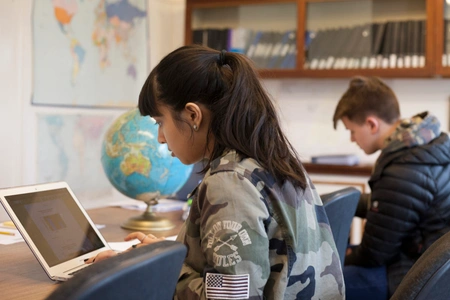
- Article
Welcome to the world of Economics at Rochester Independent College, home of the Great British Economics Olympiad Competition.
Picture this: Microeconomics is like peering into an ideal free market economy, where perfect competition reigns supreme. But life’s never that simple, right? So, we also explore the messy, real-world markets with all their quirks and inefficiencies.
On the flip side, Macroeconomics zooms out to give you the big picture, tackling national-level issues like inequality, unemployment, immigration, and those pesky trade deficits. You’ll even delve into the 2008 financial crisis and learn about the tough trade-offs governments must navigate to keep the economy afloat. As philosopher John Rawls might say, we aim to “develop principles of justice” in these complex economic landscapes.
We also delve into the exciting field of behavioural economics, where we challenge the 'ideal behaviour' assumptions of classical economics. This is the cutting-edge stuff that shows how people actually behave in economic situations—spoiler alert: it’s not always rational! Richard Thaler, a pioneer in this field, reminds us that “people aren’t robots; they’re human beings with emotions and biases.”
By the time you finish your A level in Economics, you’ll be savvy about terms like 'free markets' that dominate political debates. You’ll appreciate the bluntness of economic policy tools and understand how economic concepts can help tackle critical issues like climate change, inequality, and racism. You’ll also see through the smokescreen of many so-called economic arguments, recognizing them for the political debates they often are. Philosopher Amartya Sen highlights this, noting that “economic growth without investment in human development is unsustainable and unethical.”
With this knowledge, you'll be equipped to engage in thoughtful debates, making informed decisions that align with your values. Welcome to a journey of discovery, critical thinking, and real-world applications that will shape the way you view the world.
No country has ever ended human deprivation without a growing economy. And no country has ever ended ecological degradation with one.

100% examined. Two written exam papers, completed at the end of the course.
Exam length
Paper 1: 1-hour 30 minutes, short answer and data response
Paper 2: 1-hour 30 minutes, case study
Subject content:
This section introduces the underlying ideas and concepts of economics. It aims to explain the role of the main economic groups: consumers, producers, and the government, including their interdependence. This section also examines what is meant by the economic problem: that is how scarce resources are best allocated when faced with limited resources and unlimited wants.
In this section we look at the role of markets in allocating resources. The concepts of demand and supply are explored in depth. Different types of markets are studied, including the labour market. Finally different types of competition are studied, including competitive markets, oligopoly markets, and monopoly markets.
This section provides learners with understanding of the main economic objectives and role of the government in achieving them. Learners will investigate the effects of economic policies on markets. They will use and interpret quantitative evidence, such as unemployment figures, in contemporary and historical contexts.
Students will learn to appreciate the importance and impact of international trade by analysing data such as quantitative information on exports and imports. Learners are encouraged to consider moral, ethical and sustainability issues that arise as a result of the impact of economic activity in a range of national and global contexts.
2 Hours
35% of the total qualification
This exam draws upon themes 1 and 3 from the specification - Microeconomics
Each question is set in a context, drawing on topics from across Themes 1 and 3. The paper comprises three sections. Students answer all questions from Section A and Section B, and one from Section C.
Section A comprises a range of multiple-choice and short-answer questions.
Section B comprises one data response question broken down into a number of parts.
Section C comprises a choice of extended open-response questions; students select one from a choice of two.
2 Hours
35% of the total qualification
This exam draws upon themes 2 and 4 from the specification – Microeconomics
Each question is set in a context, drawing on topics from across Themes 2 and 4.
The paper comprises three sections. Students answer all questions from Section A and Section B, and one from Section C.
Section A comprises a range of multiple-choice and short-answer questions.
Section B comprises one data response question broken down into a number of parts.
Section C comprises a choice of extended open-response questions; students select one from a choice of two.
2 Hours
30% of the total qualification
Each question is set in a context, drawing on topics from across Themes 1, 2, 3 and 4 – Microeconomics and Macroeconomics.
The paper comprises two sections. Each section comprises one data response question broken
down into a number of parts, including a choice of extended open-response questions; students select one from a choice of two.
Theme 1: Introduction to markets and market failure (Microeconomics)
This theme focuses on microeconomic concepts. Students will develop an understanding of:
nature of economics
how markets work
market failure
government intervention.
Theme 2: The UK economy – performance and policies (Macroeconomics)
This theme focuses on macroeconomic concepts. Students will develop an understanding of:
measures of economic performance
aggregate demand
aggregate supply
national income
economic growth
macroeconomic objectives and
policy.
Theme 3: Business behaviour and the labour market (Microeconomics)
This theme develops the microeconomic concepts introduced in Theme 1 and focuses on business economics. Students will develop an understanding of:
business growth
business objectives
revenues, costs and profits
market structures
labour market
government intervention.
Theme 4: A global perspective (Macroeconomics)
This theme develops the macroeconomic concepts introduced in Theme 2 and applies these concepts in a global context. Students will develop an understanding of:
international economics poverty and inequality
emerging and developing economies
the financial sector
role of the state in the macroeconomy.
Why We Fail to Prepare for Disaster by Tim Harford – A look at why societies fail to prepare for disasters that they see coming. From hurricane Catrina, to COVID-19, Tim uses economic theory to explain our seemingly irrational behaviour.
http://timharford.com/2020/05/why-we-fail-to-prepare-for-disasters/
The Coronavirus Crisis May Lead to a New Way of Economic Thinking by Larry Elliott – A look at the lessons which can be learnt from previous economic crises such as the Great Depression, and the Financial Crisis.
https://www.theguardian.com/uk - An excellent source of economic news, opinion, and discussion.
https://www.ft.com/ – Up to the minute economic news, data, and insight from the FT journalists.
https://www.economicshelp.org/ – Articles for those looking to better understand economic theory.
http://timharford.com/ - An entertaining look at the lighter side of economics.
https://www.tutor2u.net/economics – A collection of articles, notes, videos, and quizzes to support students studying economics.
https://www.npr.org/sections/money/?t=1591793215822 – A witty, weekly, American based podcast which claims to be “The Economy Explained”.
https://www.npr.org/podcasts/510325/the-indicator-from-planet-money – This is a “little show with big ideas”. From the brilliant people at NPR Planet Money, this is 9 minutes of economic gold delivered to your smartphone daily.
https://freakonomics.com/archive/ – From the writers of the very successful book ‘Freakonomics’ comes this weekly entertaining podcast which looks at “the hidden side of everything”.
https://www.bbc.co.uk/programmes/p02nrss1/episodes/downloads - A BBC economics and statistical podcast which looks at “the numbers behind the news”.
https://www.youtube.com/watch?v=3ez10ADR_gM – Crash Course Economics: A series of short, introductory videos to Economic topics, many of which are studied on the A-Level Syllabus.
https://www.youtube.com/channel/UCQbBh9Jn2IjcSPZOiNKJu0g - Econplusdal: A series of short, tutorial videos which looks at every aspect of the A-Level Syllabus.
The reason that the invisible hand often seems invisible is that it is often not there.





1 / 5
RIC is the UK host centre for the Great British Economics Olympiad, run on behalf of the International Economics Olympiad.
The competition is open to all secondary schools and colleges across the UK. However, the questions are aimed at GCSE and A-Level students so we recommend that entrants should be at least 14 years of age. We run rounds one and two online and then finalists are invited for a day to RIC to compete for places on the national team. This year competitors came from schools including Dulwich College, Winchester, Charterhouse and The Perse School.
The competition is designed to challenge, so it will not be easy. Students should see it as an opportunity to develop their thinking and problem solving skills, and to test their existing knowledge of economics in real-world situations.
This year's winning team is travelling to Hong Kong with RIC's Head of Economics and Business David Hodges to represent the country in the international finals.
Details about the 2025 competition will be available soon.